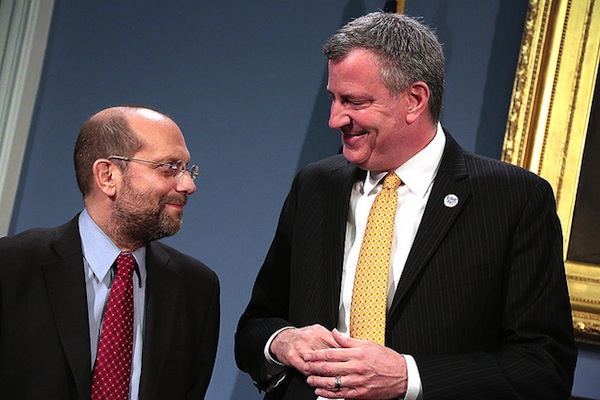
Photo by: Ed Reed for the Office of Mayor Bill de Blasio
Mayor de Blasio announcing Steve Banks as commissioner of the Human Resources Administration back in February.
Here’s a surprising stat: Fewer New Yorkers received welfare or food stamps in the first three months of the de Blasio era than over the same period last year. Over the January to March period in 2014, an average of 338,775 people received cash assistance, compared to 363,375 the year before—a 7 percent reduction. Food stamp usage was down by an average of 4 percent or 73,000 each month.
That probably is a reflection of the combination of a slightly better economy and Bloomberg-era policies more than any indication of what course benefits usage will take under de Blasio. Some have painted the mayor as an enemy of welfare reform, and worried that he would reverse the steep decrease in welfare receipt in the city that occurred under mayors Bloomberg and Giuliani.
But whether that decrease—which more or less continued even through the worst economic downturn since the Great Depression—was success or failure depends on where one sits. To some advocates, the declining numbers suggest the city is discouraging eligible people from getting the help they need.
“A lot of that has to do with barriers that were put in places by previous administrations,” Councilmember Steve Levin, the chair of the general welfare committee, told a breakfast meeting at the Federation of Protestant Welfare Agencies on Tuesday morning “Now we have an administration that has changed the basic premise. The previous administration thought that the measure of success was how few people were receiving public assistance.”
Levin feels the new administration will embrace a different goal, asking not how low the rolls can go but “how many people can we serve?” He and other advocates are hopeful the de Blasio administration—led by Steven Banks, the long-time Legal Aid lawyer—will put an end to auto-posting, a flawed method of penalizing recipients by cutting or suspending their benefits if they miss a meeting. There are also calls for the de Blasio administration to accept a wider variety of educational activities as “work activities” for the purposes of satisfying the work requirement that many benefits recipients face.
But de Blasio’s critics will be watching the welfare numbers carefully and, as with the crime rate, any rise will be seized upon as evidence that City Hall is in the grips of liberals determined to steer New York back to “the bad old days.”








